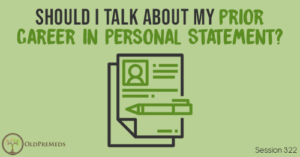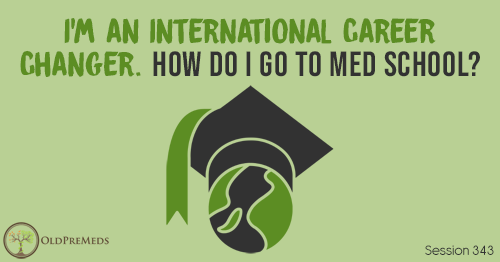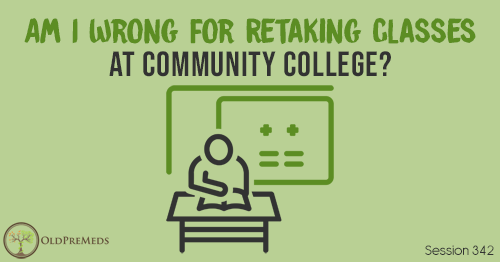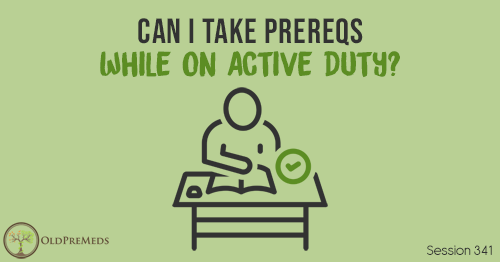Apple Podcasts | Google Podcasts
Session 322
This career changer is being advised to talk about her prior career in her personal statement. She disagrees but feels obligated by her mentor. What now?
Questions answered here on the podcast are taken directly from premedhangout.com. Go ask your questions there and use #OPMquestion.
Also, please be sure to check out all our other podcasts on Meded Media as we try to bring you as many resources as you need on this journey.
Listen to this podcast episode with the player above, or keep reading for the highlights and takeaway points.
[01:17] The MCAT Minute
The MCAT Minute is brought to you by Blueprint MCAT. Check out The MCAT Podcast, which is a collaboration with Blueprint MCAT. We’re hoping to have an amazing celebration for 300 episodes. So stay tuned. Also check out all the amazing free resources that Blueprint has to offer.
[02:00] OldPreMeds Question of the Week
“I’m getting advice to include my past career in my personal statement. I’ve written a few drafts of my personal statement and I really like how it’s coming along. I think I could be only a couple of drafts away from being done.
However, a doctor that sort of started to mentor me this year has been really pushing me to say more, say more, say more about the career I did after leaving premed. I got a master’s in speech-language pathology and then got a job in a less-than-ideal environment. I went into a very bad place in my life and did not finish out the year. I did not feel passionate enough to find a more suitable position and finish qualifying for my full licensure. I even told the company I’d worked with, not to submit the work we had done, which would have taken me a large part of the way toward licensure.
Leaving the SLP Career Behind
I fully left the field and became a test prep instructor for the next few years. At this point, I’ve healed enough from the bad experience I had as an SLP to be able to talk about that period verbally. But I guess, I now look at that part of my life like a decent boyfriend who I had a bad breakup with.
I appreciate and continue to use various things I got from it, but I don’t hold it as special. And I don’t believe it’s the most effective or wise use of my space to try and make someone else think it’s special when I don’t.
Through the few drafts I’ve done trying to follow this doctor’s advice to include more SLP work, I haven’t really gotten traction between it and trying to explain why I want to be a doctor. But I’ve more so got to a negative place… edging on the idea that it was a mistake, which I don’t think it was. But I have admittedly had that feeling at times.
I’ve done many other things in my life that I feel much more passionate about. I have done more recently. I have left on better terms. The only thing is that they are not allied health careers. But my thoughts are – so what? as long as I can pull out something that I can connect to my drive.
So I removed every mention of SLP from my latest draft. I don’t think she has read it yet. When she called to reschedule today’s meeting, she advised that I also got my last two paragraphs. And base them on my SLP background and what skills it has given me to show why I would be a good physician.
To Include or Not to Include
Basically, my question is whether or not I’m just being obstinate. Is she right that I should include SLP as a major junction? At least having its own paragraph in my personal statement. Or am I right that it just won’t be personal enough for me?
When this relationship formed, I was initially hoping she would become a recommendation writer for me. I’ve almost entirely let go of that idea. But I would still like to keep her as a present mentor because networks are important.
If I do continue in the opposite direction of what she’s been advising, does anyone have any tips on how to address that with her in order to give the relationship its best chance of survival?”
[05:30] Talking About Your Why
First off, check out The Premed Playbook: Guide to the Medical School Personal Statement. Not that this mentor is wrong, but she just has a different piece of advice than me.
'The personal statement is – Why do you want to be a doctor… not what skills do you have that you think will make you a good physician?'Click To TweetTalking about why you want to be a doctor connects to your motivations, passions, and journeys – and not to a sales pitch.
As a doctor, you need to have medical knowledge, the passion to learn medical knowledge, and the passion to take care of people who are sick. You need to figure out what their specific story is to help them in a very specific way. That’s why the journey to get to where you’re going is more important.
Medical schools want to make sure that you’re still going to have that passion to take care of sick people.
[09:53] An Example of Your Personal Statement
As a nontraditional student or old premed who went down a different path, you’re going to probably have to talk about SLP, briefly. Then you’re going to talk about what it is that’s bringing you back to wanting to be a physician.
“You don't need to talk about why you're leaving SLP, you just need to talk about why you want to be a physician.”Click To TweetUltimately, your personal statement should be about the things that confirm why you want to be a physician.
Finally, check out Application Academy, a group coaching that runs year-round now. Get 12 months of access and 10 sessions a week, covering different topics every session. We’re going to rotate through the main topics of personal statements and focus on the secondaries, interview prep, essays, etc.
Links:
The Premed Playbook: Guide to the Medical School Personal Statement












